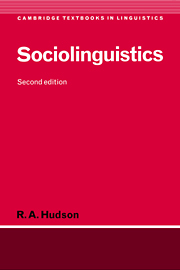Preface to the first edition
Published online by Cambridge University Press: 05 June 2012
Summary
I have written this book in the hope that it will do a number of different things, from informing and stimulating the newcomer to providing a theoretical framework within which the findings of sociolinguistics may be related to the theory of language structure (so-called ‘theoretical linguistics’). If there is a bias in my selection of topics to cover, it is in favour of those topics which will be of most interest to students of language or linguistics, but I hope that others coming from sociology, social psychology and anthropology may be interested to see how the relations of language to society look to one whose training and research has been almost exclusively in structural linguistics. As a theoretical linguist myself, I have felt free to criticise the tradition within which I work, and the writing of this book has made it clear to me that there is much to criticise in this tradition. At the same time, I have tried to pick out the many positive contributions that a sociolinguistic viewpoint can make to the study of language.
My thinking on sociolinguistics is based on a course which I have been giving in London since 1970, on work with a number of stimulating graduate students, and on discussions with other sociolinguists (most of them British). It will be clear from the text and the references who has influenced me most, but I should like to mention in particular Bob Le Page, who first suggested the writing of this book and who spent a lot of time working through two quite different versions of it with me, discussing many of the theoretical issues and shaping my thinking on them.
- Type
- Chapter
- Information
- Sociolinguistics , pp. xv - xviPublisher: Cambridge University PressPrint publication year: 1996

